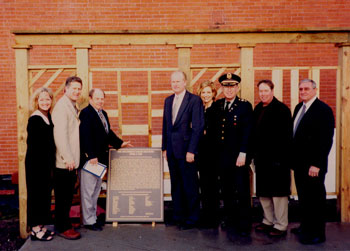Saluda Memorial, Lexington, Missouri, USA

Photo courtesy Alexander L. Baugh
On April 9, 1852, one of the most tragic steamboat accidents to occur on Missouri River took place near Lexington, Missouri. The steamboat Saluda was traveling up the river from St. Louis, to Kanesville (Council Bluffs), Nebraska and carried between 100 and 115 people Latter-day Saints.1
Several immigrating Saints who had sailed across the Atlantic aboard the ship Kennebec to New Orleans and then made their way to St. Louis where Eli B. Kelsey and David J. Ross chartered the Saluda to take those who were continuing on to Council Bluffs.2 Pieces of ice were still drifting down the river and few steamboats were operating at this time due to the hazardous conditions.
Upon reaching Lexington on April 4, difficulties occurred with attempting to push around the Lexington Bend. The Saluda did not have enough power to make it around the bend and spent the next few days attempting to get up the river and having some repairs done on the ship. The Saluda was an older steamboat which had originally sunk in 1847 and was refitted after being underwater for several months.3
On the morning of April 9, 1852, Captain Belt, part-owner and captain of the Saluda, decided to attempt again to round the bend. He is reported to have said that he would “round the point this morning or blow this boat to hell!”4 The boilers were filled to the maximum pressure and subsequently exploded shortly after leaving the dock. Approximately 75 of the 175 passengers lost their lives in the explosion with many others seriously wounded. Of these, 26 are believed to have been members of The Church of Jesus Christ of Latter-day Saints.
The citizens of Lexington responded with Christian charity, taking many of the survivors into their homes and caring for them. The city also created four committees to care for the sick, bury the dead, raise money to help the victims, and find a home for those children whose parents were killed in the blast. Abraham O. Smoot spoke of their charity when he wrote that “I shall never forget the kindness of the citizens of Lexington in caring for the living and burying the dead. The Lord certainly inspired them to do all that sympathy and benevolence could suggest in aid of the afflicted.”5
On April 9, 2002, residents of Lexington and descendants of survivors of the explosion gathered together to mark the sesquicentennial anniversary since the Saluda tragedy. A memorial park was created which includes a plaque, a bell similar to the original Saluda bell. Also, in 2004, a documentary about the tragic event was created by KBYU and the Mormon Historic Sites Foundation.
SOURCES
1 “‘Don’t Go Aboard the Saluda!’: William Dunbar, LDS Emigrants, and Disaster on the Missouri,” William G. Hartley, Mormon Historical Studies, Vol. 4, No. 1, 46.
2 Contributor, July 1892, Vol. 13, No. 9, 408.
3 Hartley, 44.
4 Ibid, 52.
5 Contributor, 414.
Map & Directions
Hours of Operation: Daylight to dark
Admission: Free
Articles & Resources
Abraham O. Smoot's account of the Steamboat Saluda
Author(s): Abraham O. Smoot
Type: First-person account
Source(s): Contributor, July 1892, Vol. 13, No. 9, 408.
I had a very narrow escape on the occasion of the Saluda disaster. I had purchased the supplies for my company to make its overland journey with, except cattle, at St Louis, and had decided to go farther up the river to buy the…
Henry Ballard's Account of the Explosion of the Steamboat Saluda
Author(s): Henry Ballard
Type: First-person account
Source(s): Contributor, July 1892, Vol. 13, No. 9, 413.
I had just been on shore to buy some provisions for a family by the name of May, which I had under my charge, and we had set down on some boxes and commenced to eat breakfast, when without the least warning, the boiler of the old boat exploded with a terrific noise, scattering death and destruction in all directions. The fore part of the boat was almost entirely…
William C. Dunbar's Account of the Explosion of the Steamboat Saluda
Author(s): William C. Dunbar
Type: First-person account
Source(s): Contributor, July 1892, Vol. 13, No. 9, 412.
On the morning of the fatal day, (Friday, April 9th, 1852,) I, together, with my previously named friends, Brothers Ross and Campbell, arose quite early to get breakfast. Hanging kettles on the stove to boil water, we stepped outside of the space encircled by the …
Contributor, July 1892, Vol. 13, No. 9, 408-414.
“Gratitude goes on for 1852 kindnesses,”  LDS Church News, June 26, 2004.
LDS Church News, June 26, 2004.
William G. Hartley, “‘Don’t Go Aboard the Saluda!’: William Dunbar, LDS Emigrants, and Disaster on the Missouri,”  Mormon Historical Studies, Vol. 4, No. 1, Spring 2003, 40-70.
Mormon Historical Studies, Vol. 4, No. 1, Spring 2003, 40-70.
William G. Hartley and Fred E. Woods, Explosion of the Steamboat Saluda, (Riverton, Utah: Millennial Press, 2002).
William G. Hartley and Fred E. Woods, “Explosion of the Steamboat Saluda: Tragedy and Compassion at Lexington, Missouri, 1852,”  Missouri Historical Review, Vol. 99, No. 4 (July 2005):281-305.
Missouri Historical Review, Vol. 99, No. 4 (July 2005):281-305.
R. Scott Lloyd, “Town memorializing 1852 steamboat disaster,”  LDS Church News, March 16, 2002.
LDS Church News, March 16, 2002.
L. Douglas Smoot, “Abraham O. Smoot and the Saluda Steamboat Explosion, 9 April 1852,”  Mormon Historical Studies, Vol. 5, No. 1, Spring 2004, 143-147.
Mormon Historical Studies, Vol. 5, No. 1, Spring 2004, 143-147.
Fred E. Woods, “Dedication of Saluda Memorial in Lexington, Missouri,”  Site & Scene, Fall 2002.
Site & Scene, Fall 2002.
